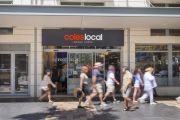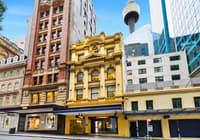
WeWork wants to give you a place to work - and now be your landlord too
Collaborative and flexible office strategies are defining the workspaces of the future.
WeWork, already a co-working industry leader, is taking these concepts even further. The company now doesn’t just want to give you a spot to work – it wants to be your landlord as well.
The international company, which has leased space in Pyrmont, Sydney, for its yet-to-be-announced first Australian co-working office space, has just launched WeLive, furnished living spaces which aim to be as flexible and people-friendly as their offices – and, of course, just as cool.
 A WeLive communal kitchen at 110 Wall Street, New York. Photo: WeLive
A WeLive communal kitchen at 110 Wall Street, New York. Photo: WeLive
WeWork already has co-working spaces in 28 cities and the same flexible, people-friendly principles have been applied to its residential ventures in two American cities, which combine a modern approach with neighbourly tradition.
Need to borrow a cup of sugar, organise a pot-luck dinner or get a group together to watch Game of Thrones? There’s a WeLive residents’ app for that.
Accommodation ranges from “micro units” to four-bedroom apartments. There are also common areas in addition to self-contained facilities that include big, fully equipped kitchens with high-end appliances, games and entertainment rooms, quiet zones and gardens.
Services such as pay-TV, housekeeping and the internet are already available and, just like its office space, customers sign up by the month instead of committing to longer leases.
WeWork co-founder Miguel McKelvey says he sat on 300 chairs to find the perfect furniture.
“For everyone who’s had that experience of coming to a new place, often it’s really exciting and there’s a lot of discovery, which is cool, but you might live a relatively spartan lifestyle for a while while you’re sort of putting it all together,” McKelvey told The Washington Post.
“We’re excited to launch WeLive, a community-driven living experience designed to foster creativity and social connections.”
 Fun approach: WeWork’s Soho West Mezzanine office spaces in New York City could easily be mistaken for one of the new WeLive living spaces. Photo: WeWork
Fun approach: WeWork’s Soho West Mezzanine office spaces in New York City could easily be mistaken for one of the new WeLive living spaces. Photo: WeWork
WeLive’s first premises are at 110 Wall Street, New York and Crystal City in Arlington, a suburb of Washington, where apartments have been converted from nine floors of an old office building.
At Wall Street, there are more than 200 units ranging from studios to four-bedroom apartments. In Crystal City, 216 units offer various studio configurations as well as three-and four-bedroom apartments. All units have at least one private bathroom.
A private studio in Crystal City starts at $USD1640 ($2236) a month, and a studio with two beds starts at $USD1880 ($2564). A four-bedroom goes for $USD4220 ($5756) a month. Residents pay a $USD125 ($170) monthly amenities fee that covers utilities, cable TV and the internet. The New York apartments are more expensive, with private units starting at $USD2550 ($3478) a month.
 Place for privacy: A one-bedroom WeLive apartment in Crystal City, Washington. Photo: WeLive
Place for privacy: A one-bedroom WeLive apartment in Crystal City, Washington. Photo: WeLive
There is also a membership fee that covers furniture, homewares and decorative items to personalise rooms, as well as community events, meals and wellness initiatives such as yoga classes.
The WeLive ethos is in parallel with that of WeWork – an expectation that residents will identify and interact with people in similar circumstances, whether it’s work hours or lifestyles.
Positive social interaction is the priority to encourage strong communities to form in WeLive “neighbourhoods” – groups of apartments that share common areas.
In a smart design move that aims to avoid awkwardness, none of the common spaces have dead ends. So anyone who walks into a room and decides not to stay doesn’t have to feel gauche by turning around and exiting the same way – they can keep walking so it looks like they’re just passing through.
“We want you to be able to look at what’s going on and see if you know someone,” McKelvey says. “If you didn’t see anyone through that whole path you could cycle back down to your room and no one would know you’re out of place if you didn’t find that place to sit down.”
 Compact but cool: A WeLive studio-plus apartment in Crystal City, Washington. Photo: WeLive
Compact but cool: A WeLive studio-plus apartment in Crystal City, Washington. Photo: WeLive
Early resident Stephanie Sutton, 31, moved into a WeLive apartment a month ago as part of the company’s test phase. Sutton, who shares a four-bedroom apartment with three others, says her favourite aspect has been the sense of community.
“It really does feel like home,” she said. “It’s a great way to develop friendships without any pressure. Here you passively make 10 friends instantly.”
New residents receive a “welcome kit” that includes a duffel bag, linen set and toiletries. Credit checks are not conducted and there are also no broker fees.
There is a 24/7 security officer as well as an onsite community manager.
 Clean living: High-end shared appliances in the laundry. Photo: WeLive
Clean living: High-end shared appliances in the laundry. Photo: WeLive
Bose speakers in the ceilings allow wireless AirPlay through iOS devices and there are flat-screen wall-mounted TVs and HDMI wall plates for ease of connectivity.
Like so many other sharing-economy ventures, WeLive appears to be the best fit for millennials – people in their 20s and 30s – although all ages are welcome.
Angela Fox’s 12-year-old son was sold on the gaming options at WeLive Crystal City, which include a foosball table in the laundry. That was enough for Fox, 48, who considers herself more experience-oriented than possession-focused. She put her furniture in storage and the pair moved into WeLive earlier this year.
 Quiet time: A communal coffee nook in Crystal City. Photo: WeLive
Quiet time: A communal coffee nook in Crystal City. Photo: WeLive
For McKelvey, the point of the WeLive community is helping people succeed.
“It could be that success for them is finding the right job, it could be finding the right friends, it could be building a family,” he says. “Whatever it is, it’s more having the conscious pursuit of a life they want rather than sort of floating along and not really concerning themselves with what their future holds.”
WeWork, a US-listed company, has leased space at 100 Harris Street, Pyrmont – a converted warehouse heritage building already partly occupied by Fairfax Media’s Domain Group, which includes CommercialRealEstate. There is no information available yet on when WeWork is expected to launch in Sydney.
With The Washington Post










